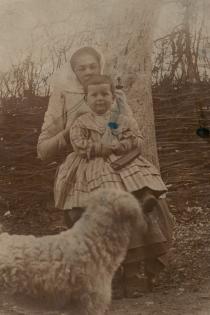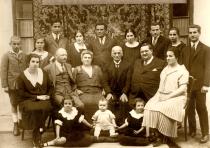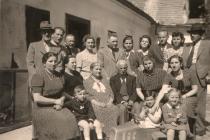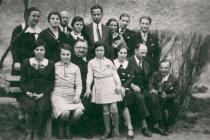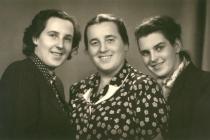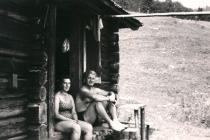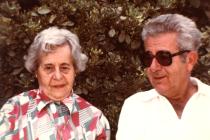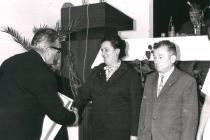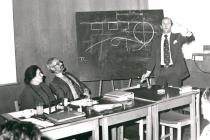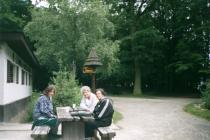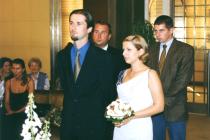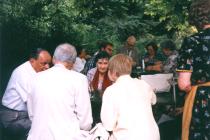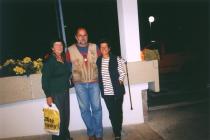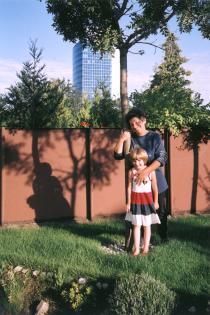This is a photo of some of my family in 1926 in Trnava, in the yard of my grandfather Emil Grun's house. My grandparents had 11 children. The other Jews joked that my grandfather had a child every second day. Some of their children, and several spouses and grandchildren, are in this photo. I am the toddler in the front row, center.
In the back row (beginning fourth from left) are Piroska, Hugo, Mariska, Laco, Sari and Lajo; seated are Margita and Salamon Reich, my grandparents Roza and Emil Grun, and my parents Eugen and Erna Milch. Only three Grun children survived the Holocaust: Mikulas, Margita and my mother.
My grandparents lived in the village of Horna Poruba. My grandfather had a shop, an inn and a farm; he sold corn. Grandfather was very eager to give an education to each child, and they came to Trnava when the children had to go to school. The three eldest sons graduated from universities. All the girls had some kind of profession, and could earn their living. One was a dressmaker; the others attended a two-year business academy.
All the daughters, including my mother, worked as accountants in a Trnava distillery. The youngest of the family, Mikulas, graduated from the business academy and also applied for a job in the distillery. But the owner was a very strict woman; she refused to hire him because she was afraid that a man would start drinking there. At that time, no one thought that girls were in danger of drinking.
My grandparents observed some of Jewish traditions, but did not keep a kosher kitchen and were not very religious. I know that having 11 children might sound Orthodox, but they weren't. They kept the main holidays, and my grandfather even went to the synagogue almost every Saturday, but he had no special post there. This was a well-assimilated, average family.
I was born in 1923 in Bratislava. I have a younger sister, and we did not raised to be any more religious than my grandparents. My mother was an atheist, and she was quite open about it. My father was not very religious, but he did believe. The Jewish holidays meant special meals, like matzah dumplings. That's the best thing about holidays, and I remember the foods best.
My father was overweight, and he suffered from heart disease. My mother attended him, and she also helped him with his work; he sold wood. When he could no longer handle the paperwork and contracts, she took over. The poor man died in July 1939.
My grandfather's eldest son, Hugo, was born before World War I. During that war, he was an officer in the Austro-Hungarian army. He studied agricultural engineering and lived at Svaty Peter as a land manager. He had two daughters, Ester and Judith. His wife was a Zionist. All Grun grandchildren were nice, but these two girls were really beautiful - in spite of the fact that their mother was, God forgive me, quite ugly. Their father was a very handsome man.
My grandfather's son Laco studied electrical engineering at Prague University. After World War I, he was unemployed, so he went to France and worked for Renault. He learned French very well, but after a few years he came back and found a job in Velka Bytca, manufacturing metal furniture. Laco married and had a daughter. I really loved Laco most of all. He liked literature and fine arts, and he and his wife used to take me to exhibitions.
My mother had twin brothers, Lajo and Mino, who did not resemble each other at all - one was short and blond, the other one was tall and dark. Lajo worked in a textile shop. He married very late, during the war; they were both deported. Mino was very talented and ambitious - he studied law in Bratislava and completed his studies with honors. He had a very sad fate. With his excellent education, he began working in an attorney's office in Orava. He was very romantic, and he fell in love with the boss's wife. This was in 1936. He took it very seriously. She had no intention of marrying him. He was very disturbed by this, but he kept it hidden. I remember he came to visit us and we went swimming. I didn't notice anything special about his behavior. But two weeks later, he threw himself under a train and killed himself.
My mother's sister Irena had an interesting fate. There was a Christian religious publishing house near where my grandmother lived, and a young clerk there fell in love with Irena. He was a nice, decent man, and they wanted to marry. But Grandfather refused; he did not want his daughter to marry a Christian. She was obedient, she cried, but if he were not so strict, she would be alive today. Later she married a nice Jewish man and went to Nova Bana. The two sisters, Sari and Irena, went into hiding in the mountains; both sisters and their husbands were shot dead at Kremnicka.
My mother's sister Margita married Salamon Reich, a butcher, and he always gave meat to the household.
I was in Hashomer Hatzair, which warned its members to escape before the deportations started. I had an uncle and two aunts in Hungary, so I went illegally to Hungary. But before we left, my mother and I went to visit Uncle Salamon. He had two daughters. Marta was married, but Katka was single. My mother tried to persuade her brother-in-law to let Katka go with me to Budapest. But Uncle Salamon would not allow his daughter to leave, and they came to a very unhappy end. Uncle Salamon and his wife were detained, but later released because Uncle Salamon was exempt from the deportation as a farmer.

